

The-success-countries-Credit-Suisse_ARAFIL20140805_0002.pdf. Wings Over Scotland's Wee Blue Book (DesktopEdition.pdf) The Difference between the United Kingdom, Great Britain and England Explained. 00442777.pdf. The United Kingdom National Debt Clock 2014 Counter >> nationaldebtclock.co.uk. Scottish Independence. Background Scotland was an independent country until the 1707 Acts of Union, which united Scotland with England (and Wales) in the Kingdom of Great Britain.
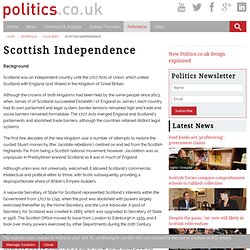
Although the crowns of both kingdoms had been held by the same people since 1603, when James VI of Scotland succeeded Elizabeth I of England as James I, each country had its own parliament and legal system, border tensions remained high and trade and social barriers remained formidable. The 1707 Acts merged England and Scotland's parliaments and abolished trade barriers, although the countries retained distinct legal systems. Citizen Kane: What will happen to the oil & gas if Scotland votes YES to independence? Well well well!
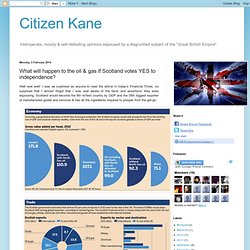
I was as surprised as anyone to read the article in today's Financial Times, so surprised that I almost forgot that I was well aware of the facts and assertions they were espousing. Independence debate: Yes, Scotland? Even pro-unionists accept that the country has all the ingredients to be a viable nation state After 307 years as part of Great Britain, Scotland will soon decide whether it is time to once again go it alone.
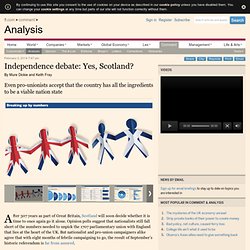
Opinion polls suggest that nationalists still fall short of the numbers needed to unpick the 1707 parliamentary union with England that lies at the heart of the UK. But nationalist and pro-union campaigners alike agree that with eight months of febrile campaigning to go, the result of September’s historic referendum is far from assured. So what would an independent Scotland look like? And what would be the impact on the remaining UK, or “rump UK” as some observers call it, of the departure of 8.3 per cent of its population and about 9.2 per cent of its gross domestic product?
Who loses if Scotland goes it alone? 25 True Facts About Scottish Independence. With the launch of “Yes Scotland” pro-Independence campaign in Edinburgh later today two things have been on my mind.
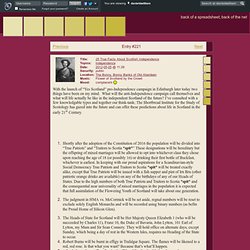
What will the anti-Independence campaign call themselves and what will life actually be like in the independent Scotland of the future? I’ve consulted with a few knowledgable types and together our think-tank; The Shortbread Institute for the Study of Scotology has gazed into the future and can offer these predictions about life in Scotland in the early 21st Century. Shortly after the adoption of the Constitution of 2016 the population will be divided into “True Patriots” and “Traitors to Scotia *spit*” These designations will be hereditary but the offspring of mixed marriages will be allowed to opt into whichever class they chose upon reaching the age of 18 (or possibly 16) or drinking their first bottle of Buckfast, whichever is earliest.
. (1) Or the Gaelic equivalent (2) Even if you are humming in Gaelic. (3) Excluding curling and cycling and crown bowls. Scottish independence: the fiscal context. Download BibTex file | E-mail to a friend In making a decision over whether to seek independence from the rest of the UK, one of the many issues that the Scottish people will need to consider is the fiscal consequences.
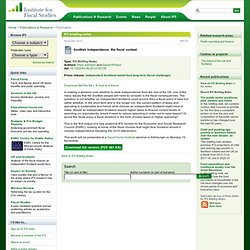
The question is not whether an independent Scotland could survive from a fiscal point of view but rather whether, in the short term and in the longer run, the current pattern of taxes and spending is sustainable and hence what choices an independent Scotland might have to make. Would an independent Scotland require higher taxes to finance current levels of spending (or, equivalently, would it need to reduce spending in order not to raise taxes)? Scottish Independence - Facts and Debate. Scotland, which was first founded as an independent country in the early middle ages, joined with England and Wales to create the United Kingdom (UK) in 1707.
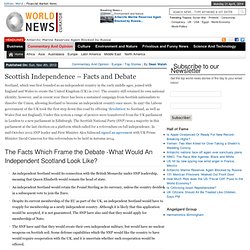
The country still retained its own national identity, however, and in recent year there has been a sustained campaign from Scottish nationalists to dissolve the Union, allowing Scotland to become an independent country once more. In 1997 the Labour government of the UK took the first step down this road by offering ‘devolution‘ to Scotland, as well as Wales (but not England). Under this system a range of powers were transferred from the UK parliament in London to a new parliament in Edinburgh. The Scottish National Party (SNP) won a majority in this parliament at the last election on a platform which called for a referendum on full independence.
In mid-October 2012 SNP leader and First Minister Alex Salmond signed an agreement with UK Prime Minister David Cameron for this referendum to be held in Autumn 2014. Simplify 2014. The A to Z of Independence - Sorting myth from fact. Tuesday, 14 February 2012 01:03 By Paul T Kavanagh Ever since the independence referendum was announced, Scotland has witnessed a gradual deterioration in the standard of debate, with scaremongering in place of reason and myth masquerading as truth.
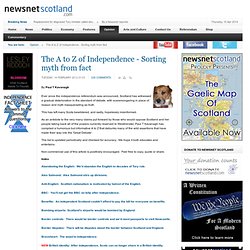
This has left many Scots bewildered, and sadly, hopelessly misinformed. As an antidote to the very many claims put forward by those who would oppose Scotland and her people taking back all of the powers currently reserved to Westminster, Paul T Kavanagh has compiled a humorous but informative A to Z that debunks many of the wild assertions that have made their way into the 'Great Debate'. The list is updated periodically and checked for accuracy. Non-commercial use of this article is positively encouraged. Index. 8087151692_47b22b8aba_o.gif (448×600)
Cabinet changes announced. Listen Cabinet changes announced The Scottish Government's new Cabinet team has been announced by First Minister Alex Salmond, subject to the necessary parliamentary approval.
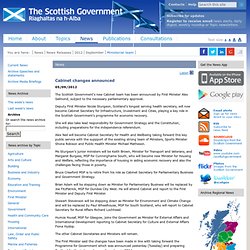
Deputy First Minister Nicola Sturgeon, Scotland’s longest serving health secretary, will now become Cabinet Secretary for Infrastructure, Investment and Cities, playing a key role in the Scottish Government’s programme for economic recovery. She will also take lead responsibility for Government Strategy and the Constitution, including preparations for the independence referendum. Alex Neil will become Cabinet Secretary for Health and Wellbeing taking forward this key public service with the suppport of the existing strong team of Ministers, Sports Minister Shona Robison and Public Health Minister Michael Matheson.
Bruce Crawford MSP is to retire from his role as Cabinet Secretary for Parliamentary Business and Government Strategy. Scottish referendum: 50 fascinating facts you should know about Scotland. Would an independent Scotland be financially sound? Newsnet Main Articles Wednesday, 01 February 2012 05:59 By John Jappy As a civil servant in London, and being part of the establishment, I always accepted the general view that an independent Scotland would not be able to survive on its own without financial help from the London Exchequer.
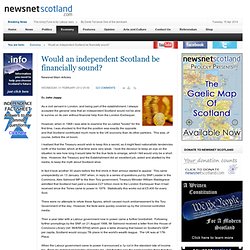
However, when in 1968 I was able to examine the so-called "books" for the first time, I was shocked to find that the position was exactly the opposite and that Scotland contributed much more to the UK economy than its other partners. This was, of course, before the oil boom. I realised that the Treasury would wish to keep this a secret, as it might feed nationalistic tendencies north of the border, which at that time were very weak. In fact it took another 30 years before the first chink in their armour started to appear. Scotland independence: all the data you need. What kind of country would an independent Scotland be?
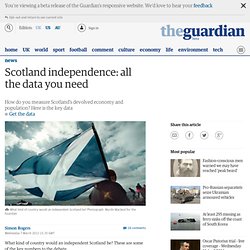
These are some of the key numbers to the debate. It's in the news today as Severin Carrell reports: A vigorous dispute has broken out over Scottish independence after a report claimed that North Sea oil would have made Scotland better off than the rest of the UK last year … The Scottish government's annual analysis of spending and revenue showed that Scotland had a smaller deficit proportionally than the rest of the UK in 2010-11, but only if its full geographical share of North Sea oil revenues, worth nearly £8.8bn last year, was included. The figures out today are from Government Expenditure and Revenue Scotland 2010-2011, which breaks down spending and revenues north of the border.
Scottish independence: the essential guide. 1. The issue at a glance2. Why is it being talked about now? 3. A brief history4. What happens next? 1. Around a third of Scotland's 4 million voters believe that Scotland should leave the UK and become independent, ending the 305-year-old political union with England. Scotland’s Independence: Myths, facts and figures. Like Norway, Scotland has enough oil to rank among the richest countries on this planet. The claim of the of the UK Chancellor of the Exchequer that seems to suggest that Scotland will not be viable as a country is a very hollow one in the ears of intelligent people.
Yet, apart from the poor under par health situation, there is poverty in the country. Even with all the efforts to create a Scottish social model that is built on equality, there is still significant inequality between the haves and have-nots. There is an unacceptable level of social exclusion which no doubt underlies a level of resentment. Scottish Republic: The Positives of the Scottish Independence Facts. Scottish Parliament general election, 2011. The 2011 Scottish Parliament general election was held on Thursday, 5 May 2011 to elect 129 members to the Scottish Parliament. Scottish Parliament general election, 2007. The 2007 Scottish Parliament election was held on Thursday 3 May 2007 to elect members to the Scottish Parliament. It was the third general election[1] to the devolved Scottish Parliament since it was created in 1999. Local elections in Scotland fell on the same day. Background[edit] Scottish Parliament general election, 2003.
Scottish Parliament general election, 1999. Your Scotland, Your Voice: A National Conversation. Acts of Union 1707. Scottish Parliament Building. Scottish Parliament.